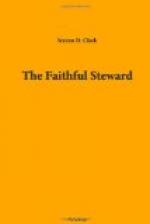This is the result of the unchanging principles of the Divine Mind. They grow with a steady heat, equally prompting him to activity at every moment. Hence, like the sun shining in its strength, God sends down unweariedly the rays of his love, both on the evil and on the good, crowning their days with “loving-kindness and tender mercies.” Indeed, should the ardor of his love cool, or the hand of his power or grace be withdrawn but for a single moment, all our hopes would be dashed, our very existence cease.
From this characteristic of the Divine beneficence, the inference is irresistible. If man is bound by the condition of his being, to imitate God in his moral character and conduct, he must cherish the same abiding principles of benevolence, and carry the same steady hand in diffusing good. The ardor of his love may never cool; his hand of charity never weary. He must be god-like. With permanency and uniformity of conduct, imitative of his own, our Holy Sovereign will be well pleased. But with him who is wavering in his principles; vacillating and impulsive in his purposes of good; at one time toiling for others with the utmost earnestness, and then, forgetful of their wants and woes for months together, he must be displeased. How unlike our Great Exemplar. He was always doing good. “The labor of his life was love.” Reader, would you please your compassionate Savior? Go, and do likewise.
III. From the necessity of system to success in any kind of business. One cannot accumulate wealth, acquire learning, rise to distinction in any of the professions or trades without system. Even the pleasures of life depend much on regularity; otherwise they cloy and become insipid. He, who is unsteady in his habits, now indulging in ease, and now straining every muscle; who, as some excitement arouses him,—such perhaps as the fresh inculcation of economy and industry, flares up and bustles about, resolves that his business shall henceforth be prosecuted with vigor and managed with precision, and in a few days relapses into his old, careless, inefficient habits, heedless alike of prudence and precept, gives little promise of success in any department of life. Or should one be perseveringly industrious, but suffer his affairs to lie in confusion, like the material world at its birth, he would be deemed at best but a busy-body. If he intends to succeed, he must have some established principles and a fixedness of purpose, which will prompt to accuracy and method, would be the universal decision of the wise. This is reasoning correctly. But must men practise on system in providing the means of personal supply and gratification; while in the Divine work of relieving the sorrows and wants of others, all system is matter of indifference? Is order so important in the accumulation of property; while the diffusion of it, in obedience to God’s commands, may be safely left to the spontaneous impulses of feeling?




